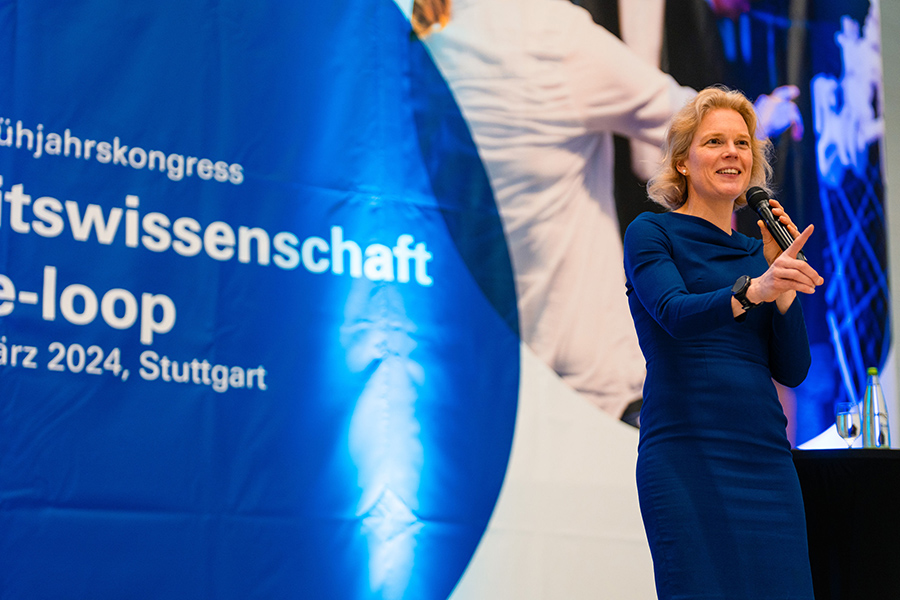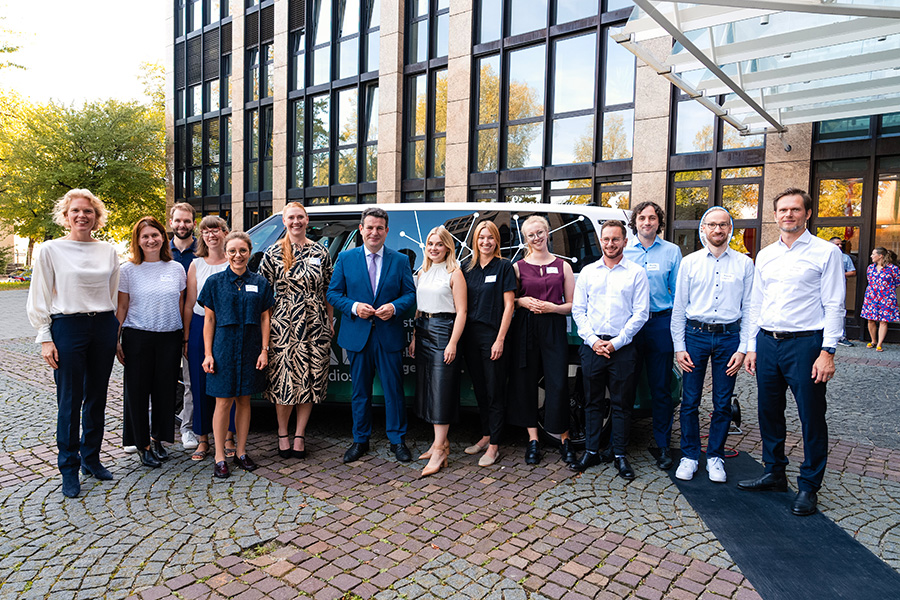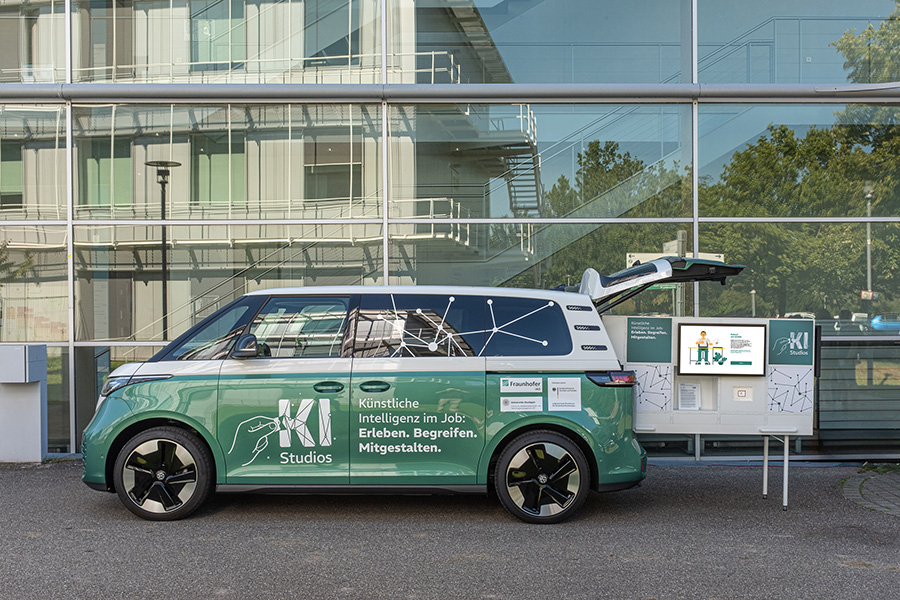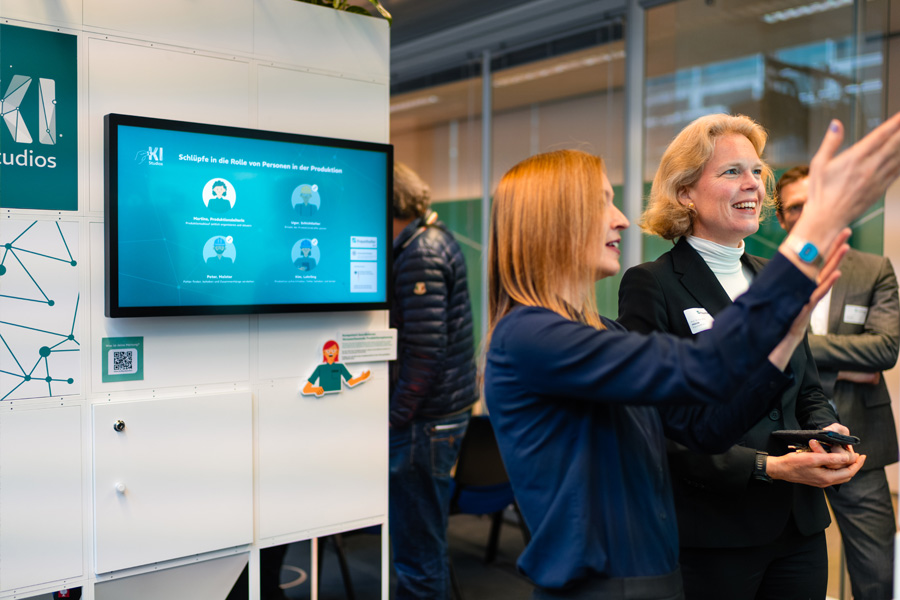
Targeted immigration to combat skilled workers shortage – role model USA?
While the world's population is growing, many western industrialised countries are facing a shortage of skilled workers. Katharina Hölzle, professor for Technology, Management and Human factors at the University of Stuttgart, explains what needs to change in Germany.
Ms Hölzle, there is a shortage of workers not only in academic professions, but also in care, education and skilled trades. Could large-scale management of qualifications and migration be a simple solution to the problem?
In the western world, in Europe and in Germany, too, especially with so many Big Tech firms established there, qualified young people are urgently needed. In contrast, there are many young people in the countries of the global south, but they are less qualified and the industries there are less developed. So it would make perfect sense to train these people in our country and keep them in our labour force, but also to send them to their home countries as ambassadors to support economic development there.
The United States shows us what targeted immigration can look like. Texas, for example, benefits from a strong influx from the northern states of the US and from Mexico. Politicians are making consistent efforts to attract high-tech companies and workers from Silicon Valley. I recently accompanied the Minister of Economic Affairs from Baden-Württemberg on a delegation trip to Texas to find out more about start-ups and "new space". Systematic tax policies are used to attract skilled labour from the southern states. Engineers, for example, only pay 10 percent tax there.
How does China compare in terms of available human labour and skills shortages?
China currently has a higher number of well-educated young people than ever before. Universities in China have massively increased their capacity and can now educate their own students instead of sending them abroad. At the same time, however, there are not enough vacancies for these graduates. Youth unemployment in China is estimated to be between 20 and 60 percent. In order to have any chance of getting a job at all, many Chinese are now completing two or even three degree programmes at the same time. The Chinese have a great willingness to learn, paired with driving ambition.
India has great potential when it comes to attracting young people. Many initiatives are being launched to attract skilled labour from India. The number of Indian students is steadily increasing and they are willing to learn German. Many of them have the goal of staying in Germany. It would also be beneficial for Europe if we entered into targeted cooperation with India at a national level.
What significance does the shortage of skilled labour have for Germany?
Germany has the problem that many skilled workers are too old and too few young people are coming in. In addition, the number of students is declining, particularly in the STEM subjects. Engineering degree programmes are experiencing a decline of almost 40 percent. Germany is dependent on its skilled labour. We have little to no other resources. We will never earn our money by mining rare metals. Even an energy-intensive industry will no longer bring us the desired income. We will therefore have to switch to other industries, which will also require well-trained skilled labour.
Germany is dependent on its skilled labour. We have little to no other resources.

Let's take a look from the perspective of entrepreneurs. Which sectors are particularly affected by these problems?
The unemployment rate in Germany is around 6 percent, as confirmed by “Bundesagentur für Arbeit”. At the same time, the number of vacancies continues to rise. There are vacancies above all in the transport and logistics sector, in retail and in medical professions such as hospital nurses. Skilled labour is also urgently needed in the skilled trades. There is a predominant shortage of apprenticeships. In 2023, there were around 70,000 to 80,000 vacant training positions, and small and medium-sized companies in particular are struggling to find trainees.
It is also worrying that there is hardly any willingness to undertake further training. The lack of additional qualifications is a real problem for Germany as a country with limited resources. With regard to the automotive industry, for example, the focus has long been on the combustion engine, which is why there is now a shortage of skilled labour in the field of electric motors. However, retraining is not easy.
The lack of additional qualifications is a real problem for Germany as a country with limited resources.
Why is that?
Some claim that we are too satiated and too fatigued to work. By comparison, everyone in China seems to want to work. In Germany, on the other hand, it would often seem that young and old people see little need for training and further education because they believe that they already have a secure job without it.
But the problems go deeper than that. I am very concerned about the falling numbers of engineering students I mentioned earlier. Three factors could be responsible for this. Firstly, the attractiveness of the automotive industry is declining – as is that of electrical engineering and mechanical engineering. Secondly, people's insecurity, their decreasing willingness to continue their education and, in some cases, to work. And thirdly, a questionable degree programme structure. At the University of Stuttgart, for example, for which I can speak, time has, in some areas, stood still. There is too little team and project-based learning and teaching. Digitalisation, sustainability and planning for the future are all topics that are rarely found in taught degrees.
Has the willingness to work declined in Germany compared to people elsewhere in the world?
The Merkel government ensured stability for 16 years, which is certainly a positive thing. However, this has meant that we have become somewhat lazy, relying on the state to take care of everything. But in today's world, that no longer works. It is time to redefine the concept of work. Work often has negative connotations, especially among young people, and is seen as exploitation or a loss of quality time. Instead, we should see work as something creative, something that adds value and is fulfilling – something with a certain shimmer and a sparkle.
And now artificial intelligence (AI) is making ever greater inroads into the world of work. How can we humans keep pace?
AI is of great importance. Digital technologies are indispensable, as they are becoming increasingly important in various areas such as law, medicine, care and retail. We need to actively engage with them and incorporate them into our education. I recommend that my students use generative AI to summarise texts and help them prepare for exams. However, it is essential to critically reflect on the answers and understand how the AI arrives at its answers, how an algorithm works.
And even though the number of computer science degree programmes is increasing, there are still too few students and specialists. Developments in Texas and China show that we still have a long way to go. To catch up, we would need ten times as many computer science students and specialists.
And how can we prepare people for this, what can or must SMEs in Germany in particular do?
We can certainly ask generative AI for answers in the future. But there are human skills that we cannot (and do not want to!) replace. We must learn to think in scenarios to enable the development of alternative courses of action. We need creativity, entrepreneurial thinking and collaboration. The Stifterverband calls these skills "future skills".
There are also deeply human skills that will continue to set us apart from AI in the future. I'll name three: curiosity helps us to ask the right questions. Empathy makes it possible to recognise human needs and work successfully in a team. Initiative means taking responsibility and getting things done. This triumvirate model is of central importance for the German economy and especially for SMEs, but it certainly needs to be translated into concrete skills for specific use cases.
That sounds like hope and a big task at the same time. Can German companies remain competitive despite the shortage of skilled labour, falling student numbers and the occasional lack of motivation?
Yes, I firmly believe so – for Germany. We still have an inventive spirit and good technologies. We can do better in Germany. But to do so, we need a positive and authentic narrative. Clarity in our statements. A political framework that allows us flexibility. Local companies are frustrated because they don't know what the legislation will look like in a year's time. At the same time, we need to be fast and agile to try out new things. We need courage to tackle these things. Companies are willing to do so, but they are often restricted by formalities and administrative burdens. They need planning security from politicians, courage and the necessary skilled labour.

How can we attract these skilled workers? What can help?
We need to convince future skilled workers of what we have to offer. To do this, it is important that they understand what they are working for and recognise their contribution. People want to be seen and valued. But it must also be clear that we cannot stand still, but must be interested and actively continue to educate ourselves and develop further. Companies need to take a more active role in this instead of just paying a salary.
Another important aspect is thinking in ecosystems. Keyword: labour migration. Skilled workers have an interest in coming to Germany. However, companies in Germany often find it difficult to work together and co-operate. In order to attract skilled labour, we as a society need to create an ecosystem that is attractive to young people and families. This involves co-operation between companies, communities, universities, schools, associations and local partners. Only together can we create an ecosystem in which these people are warmly welcomed and can feel at home.
In order to attract skilled labour, we as a society need to create an ecosystem that is attractive to young people and families.
What do you consider to be crucial in combating the shortage of skilled workers and what measures do you consider to be effective?
For me, the classic model of the labour economy is crucial, which is based on three decisive levers: people, technology and organisation. To put it clearly: we need motivated people who want to enter a future-oriented profession. This is achieved through motivation, education and training, and labour migration. The organisation is about creating a working environment in which people feel valued and appropriately rewarded. The third point is technology, in particular the great potential in the areas of AI and robotics mentioned earlier. We need human-centred development here in order to get people on board.
Can we also use this to reach the skilled trades and care professions, which are also suffering from a glaring shortage of skilled labour?
My two institutes are currently running an exciting project with the support of the Federal Ministry of Labour and Social Affairs: the AI studios! These are explicitly aimed at SMEs, small and medium-sized enterprises, particularly in the skilled trades and service sectors. We are travelling through Germany with two AI buses and visiting companies. Application examples are shown, such as an AI-based tool for care facilities that determines the actual state of health of the people in these facilities. These prototypes are impressive and help people to overcome their fears and recognise the potential of the technologies.
The experience has been consistently positive. These are the practical examples that people want to see, with work being visualised for people to see. And people like it.
We need to stand up for the value of human labour and take people on the journey of transformation. Then it will work. And with the AI Act, we in Europe are showing how this can work. This requires a constant balancing of what is feasible and what is desirable. This is how we strengthen collaborative innovation in Europe. We should be optimistic, because this is the only way we can create a Europe worth living in.

This interview was conducted by Timo Bergold and Maike Tippmann. 04/2024

About Katharina Hölzle
Prof Dr Katharina Hölzle has been Director of the Institute of Human Factors and Technology Management IAT at University of Stuttgart and of Fraunhofer IAO since April 2022. Since April 2023, she has been working as a technology officer for the Baden-Württemberg Ministry of Economic Affairs. She was previously a member of the Federal Government's High-Tech Forum. She is also a founding member of #shetransformsIT. Her research focuses on technology and innovation management, labour science and digital transformation. A particular focus is on the interaction between people, technology and organisation.

Timo Bergold
… is responsible for international communication projects at Deutsche Bank. He finds it exciting to see how the world of work is changing in Germany compared to other countries, particularly the United States and China. He is interested in how companies need to position themselves in order to attract skilled workers.
Recommended content
Entrepreneurial Success | Story
Skill DNA – the key to tomorrow’s working world Skills DNA – the key to tomorrow’s working world
What strategies can we use to tackle the transformation of global labour markets? The US start-up SkyHive is rising to the challenge.
Entrepreneurial Success | Opinion
Wanted! The global competition for skilled workers Wanted! The global competition for skilled workers
Senior Economist Marc Schattenberg, explains the current skills shortage and what will happen without labour migration.
Entrepreneurial Success | Insights
“Large language models are built to hallucinate.” “Large language models are built to hallucinate.”
AI is finding its way into journalism. Media company BurdaForward shows how hybrid teams of people and machines can succeed.







